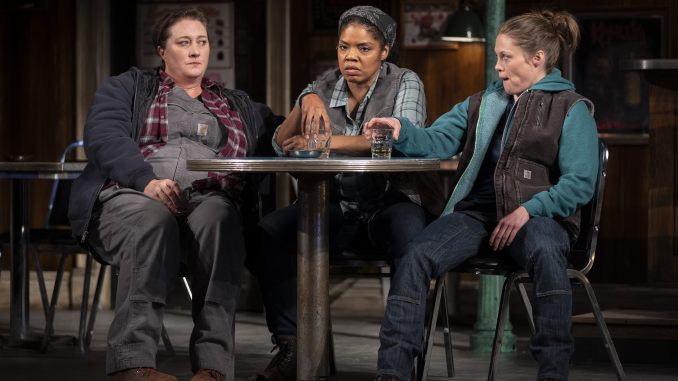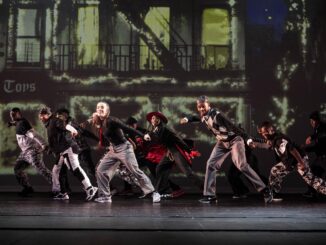
Did you know that technology and globalization are changing the American economy, especially for blue-collar workers?
I know. Let that one sink in for a moment.

Lynn Nottage’s Pulitzer Prize-winning play Sweat, which is currently making its Chicago debut at the Goodman Theatre, centers on just this unstartling revelation. Nottage’s credentials are impressive; both the second African American woman to win a Pulitzer Prize for Drama and the first woman to win two Pulitzer Prizes for Drama, Nottage is a superb writer, as Sweat demonstrates. Beginning from the end, the story opens with two young men, Jason and Chris, talking to their parole officer after an unspecified event led to their both being imprisoned for eight years. The play then jumps backward in time and traces the events that led to their crime.

These events center on the Olstead Factory, where nearly everybody in the play works. It’s difficult to get a job at the factory; you have to “know somebody,” as Tracey explains. Workers can trace their family’s history at the factory back generations and take great pride in their positions. Trouble starts, however, when Tracey, a white woman, and Cynthia, a black woman, apply for the same management position. Soon afterward, management is asking workers to accept huge cuts to their pay and benefits, and the workers go on strike, hoping against hope that the union will pull through for them and furious at the Spanish-speaking strikebreakers who come in to replace them.

The Goodman, of course, has the budget to hire the best of the best. Tyla Abercrumbie, who plays Cynthia, is an absolute spitfire, flipping from peacekeeping to righteous anger at the drop of a hat. Keith Kupferer, who plays bartender Stan, successfully locates the great empathy beneath Stan’s no-nonsense exterior. And Kirsten Fitzgerald is stunning as Tracey, whose barely contained rage at her circumstances bubbles below the surface of her every line. In addition to the stellar cast, the play also boasts a jaw-droppingly detailed set by Kevin Depinet and excellent sound design by Richard Woodbury. Costumes by Mara Blumenfeld successfully transport characters through time, place, and circumstances; Cynthia, for instance, visibly transforms from party girl to factory worker to office worker across the span of the first act.

Nottage’s writing is funny, gritty, whip-smart, and gut-wrenchingly tragic in turns. I was amazed at how her words could make the audience laugh in the midst of the play’s most dramatic scenes and hint at storms brewing in its most lighthearted ones. Her characters are complicated, flawed, and memorable. I’m not surprised by the accolades her script has received.

And yet.
Am I supposed to be surprised by the changing workplace of rural America? I feel like a major newspaper unveils an article about this very subject every week or so, asking me to feel sorry for working-class white people who feel like immigrants are stealing their jobs. In the case of the characters of Sweat, the Colombian Oscar actually does steal their jobs by breaking the strike. I expect the play was supposed to make me feel empathy for both sides, to better understand the painful complexity of the situation. And on one hand, the script did make me feel for displaced factory workers like Tracey and Chris in a way the New York Times never could.

But as character after character lamented that the factory owners were screwing them over after decades, even generations, of loyalty to the company, all I could think was “capitalism be like that.” For me, the takeaway is to never devote your life to a company because companies exist to make money, not take care of the people who work for them and yes, they will screw you over if that’s what puts money in executives’ pockets. I wanted to scream at the characters that the strikebreakers—who themselves are just working-class people trying to get ahead in a false meritocracy—are not the enemy: the enemy is the rich executives profiting off all of their misery. The factory workers fighting the strikebreakers is exactly what they want: if they’re busy squabbling with each other, they can’t turn their attention to fighting against the rich people who are screwing them both.

One thing Sweat does do that other plays with similar themes, like Rebecca Gilman’s Soups, Stews, and Casseroles: 1976, fail to is deal with the complexity of race as it relates to economic uncertainty. Multiple characters make flagrantly racist remarks with no consequences, and Oscar is frequently referred to as an immigrant despite being born in the States. But at the same time, Cynthia and her son Chris are black folks who committed themselves to the factory, too, who saw it as a way to improve their situation. I appreciated that the play wrestled with race in a realistic and meaningful way.

Sweat is perhaps the pinnacle of its genre: plays about the changing circumstances of working-class Americans. It’s the best play of its kind, no doubt; it’s just not a kind of play that’s particularly mind-blowing, especially at this moment in history.
Ticket Information
Location: The Albert Theatre, The Goodman, 170 N. Dearborn
Dates: March 18 – April 21, 2019
Tickets: $20 – $80; subject to change. Available at the Goodman Theatre website, by telephone at 312.443.3800 or at the box office (170 N. Dearborn)
All photos by Liz Lauren.




Be the first to comment